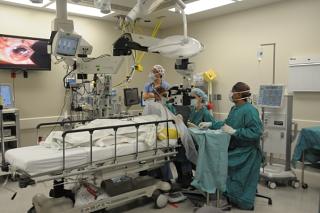
Author: Melinda Rogers
The cloudiness of living with cataracts once shaped every waking moment for Leitha Harvey.
The 64-year-old massage therapist from Salt Lake City struggled through most workdays, relying on co-workers to clock her in-and-out and to write down the names of her clients because she couldn’t see clearly enough to complete those basic tasks. She drove to work in the sunlight, but returned home after dark — hoping she didn’t accidentally cross into oncoming traffic. She knew her blurred vision put her at risk, but she didn’t have other options: She couldn’t afford insurance on her own and didn’t earn enough to pay for surgery out-of-pocket.
As she wondered if she’d one day lose her ability to provide for herself by losing her vision completely, an unexpected benefactor stepped forward to help. The University of Utah’s Moran Eye Center selected Harvey as one of 12 Utahns to participate in its annual Charitable Surgery Day last year.
As one of the patients at Charitable Surgery Day, Harvey underwent a procedure to fix her advanced cataracts, which has resulted in better vision and an ability to function more productively every day in the workforce and at home.
“I didn’t think (help) was available for someone like me,” said Harvey, who had heard about Moran Eye Center’s renown international outreach programs but was surprised to learn that the center sponsors programs for those in need in Utah as well.
“I have a new lease on life,” she said of receiving surgery to fix her cataracts, a condition that clouds the normally clear lens of the eye.
Stories like Harvey’s are a hallmark of Charitable Surgery Day. The event started in 2007 as the brainchild of then fourth-year medical student Brian Stagg and Moran Eye Center ophthalmologist Jeff Pettey, M.D. and has since transformed into a yearly event where doctors, nurses and other medical personnel volunteer their time to help those in need. This year, on Oct. 12, a dozen more grateful community members again will receive the gift of improved sight from the Moran Eye Center.
Bradley Katz, MD, PhD, said Moran’s outreach program offers a helping hand to patients who are in situations like Harvey’s.
“She is 64 and doesn’t yet qualify for Medicare or Medicaid. She works, but doesn’t make enough for health insurance. Even if she did, cataracts are an elective surgery not always covered by insurance,” said Katz, an ophthalmologist who has volunteered several times at Charitable Surgery Day.
Pettey, one of the founders of the event, also sees Charitable Surgery Day as a chance to give back to the community.
“I believe that no one with preventable vision loss or blindness should remain in darkness. We have the collective will and ability to provide state of the art care to the individuals in our community who cannot afford or do not have access to healthcare. No one in our community should be living with curable vision loss,” said Pettey.
Candidates for Charitable Surgery Day are selected through a careful process which in most cases starts with identifying patients in need through Moran Eye Center’s other outreach programs in the community. The center works at satellite locations in Utah, including the Homeless Health Fourth Street Clinic in downtown Salt Lake City, the Maliheh Free Clinic in Millcreek, the Salt Lake County Youth Detention Center in West Valley City, and the Glendale Community Center on Salt Lake City’s west side. Ophthalmologists volunteer their time at the community facilities to provide preventative care and basic screenings for patients, while also screening for more severe disease or eye damage. When they come across a patient who requires more extensive care or surgery, a uniquely comprehensive patient advocacy process begins and patients are sometimes steered into the Charitable Surgery Day program to receive care. Costs for the program are funded by the Moran Eye Center.
For patients like Harvey, help from the Moran Eye Center has given her back aspects of life taken away by poor vision. She cried when opening her eyes after surgery to see a whole new world.
“My gosh … everything is so bright,” she said, recounting adjusting to her improved vision. “I’m thrilled; I’m energized … I’m just so grateful they gave me back my vision.”
Reactions like Harvey’s are rewarding to doctors who donate their time to Charitable Surgery Day. Albert Vitale, MD, medical director for the Moran Eye Clinic at the Fourth Street Clinic, said it’s gratifying to help a small part of the community in need of eye care.
“Our work serves an unmet need for the uninsured and marginalized. It also gives residents an opportunity to perform surgeries and expands the Moran Eye Center’s mission of service at home,” said Vitale.
